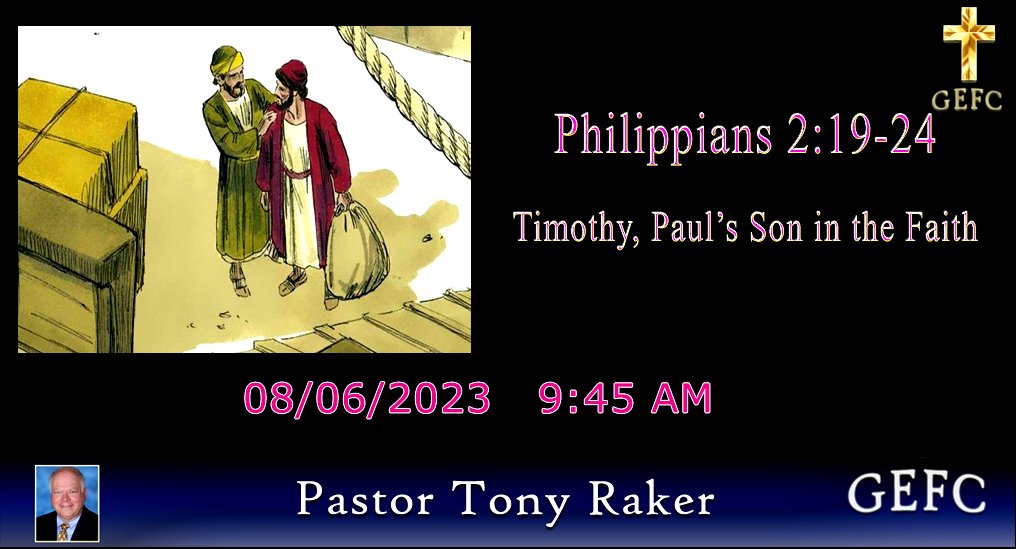
Paul had many with whom he worked, but Timothy proved unique:
Philippians 2:20: For I have no one like him, who will be genuinely concerned for your welfare.
- Grammatical Usage: “like him” or in the Greek, “isopsuchos” meaning, “like-minded attitude; of the same mind and spirit”; “genuinely” or “gnésiós” meaning, “truly, honorably, sincerely”.
- Literal Interpretation: Because I have nobody who shares my attitude – the same mind and spirit – who will care truly, honorably, sincerely for your welfare.
- Contextual/Comparison: God keeps His Word: God continually uses His Word.
- PAUL’S SPIRITUAL RELATIONSHIP WITH TIMOTHY
This was a three-fold relationship:
Of Father and Son (v. 22; 1 Timothy 1:2 and 1:18; Timothy was Paul’s spiritual son per 1 Corinthians 4:15).
Of Master and Assistant (v. 19 “to send”). Timothy was available to do Paul’s bidding, and he recognized that Paul was his spiritual leader and superior. We are “all one in Christ Jesus” (Galatians 3:28), but there are times when we must submit to those over us in the faith.
Of Fellowship in the Gospel (v. 22). Notice, Paul does not say, “he has served under me”, but “he has served with me.” This is an indication of Paul’s graciousness and humility. It was a partnership, and both Paul and Timothy were “God’s fellow-workers” (2 Corinthians 6:1).
- PAUL’S TENDER AFFECTION FOR TIMOTHY
Paul frequently addresses Timothy in terms of great affection. Now look at verse 20: the word “likeminded” may be transliterated, “of the same mind and spirit.” This reminds us of David and Jonathan (2 Samuel 1:26), with this difference: Paul was thirty years older than Timothy. How grateful we are for spiritual fathers!
- PAUL’S GRACIOUS COMMENDATION OF TIMOTHY
The apostle said a very great thing about Timothy in v. 22; the words “has proved himself” may be translated as “He has stood the test”. Could there be a greater commendation than this? To be a Christian will bring testing; it is inevitably so. It was so in the case of Timothy and Paul commended Timothy for:
His dependability (v. 19). Paul could rely upon Timothy.
His sincerity (v. 20). Notice the word “genuine” here.
His self-forgetfulness (vv. 21-22). Particularly notice the word “but” in v. 22. Timothy was different from “everyone” (v. 21).
In concluding this study, turn to the Second Epistle of Paul to Timothy, “which has to do with the personal walk and testimony of a true servant of Christ in a day of apostasy and declension” (Scofield), and consider:
- PAUL’S LOVING COUNSEL TO TIMOTHY
Of the many exhortations in 2 Timothy, seven, introduced by keywords, prove essential counsel:
- “FAN INTO FLAME” – 1:6-7. The gift which Timothy was to “fan into flame” was evidently the gift of the Holy Spirit. It is as though Paul said to Timothy, “Let the Holy Spirit blaze up and set your whole being on fire,” in other words, Ephesians 5:18! We need this exhortation; notice in 7 that if we will “fan into flame the gift of God,” we shall experience emancipation, enduement, enrichment and enlightenment.
- “KEEP” – 1:13. Compare 1 Timothy 6:3, which explains what is meant. Paul encouraged Timothy to keep hold of the truth because he lived in a day of apostasy – as we do (1 Timothy 1:3-10; 4:6; 4:16 and 6:20). Notice how we are to keep hold of the truth – in faith (God-ward); and in love (man-ward) – compare Ephesians 4:15.
- “ENDURE” – 2:3-4. Timothy was a soldier, and as such he needed to prepare to endure hardships. The Christian life is no “bed of roses”. Grace is needed ( 1), but grit is needed also (v. 3) – compare Luke 9:23. Because there is a war on (v. 4), we are to free ourselves from every entanglement for the very purpose of pleasing one’s superior.
- “PRESENT” – 2:15. Timothy’s great ambition was to be that of gaining God’s approval. The way to achieve this ambition is to give the Word of God its rightful place in our lives, and this will safeguard us against unspiritual babble which only leads people astray; upsetting the very faith of some ( 16 -18; 23).
- “FLEE” – 2:22. This simply means “to run away from” (1 Timothy 6:9-11). What are we to run away from? “Evil desires of youth” (compare 1 Timothy 4:12, i.e. those temptations to impurity which are especially perilous in the time of youth). We are to “flee” from every suggestion of impurity, and then we are to “pursue” four things ( 22). Read Genesis 39:7-12 and compare Proverbs 18:10.
- “CONTINUE” – 3:14. So many start but do not go on (John 8:31; 15:9, and compare Acts 1:14; 2:42; 13:43; 14:22; Colossians 4:2 and Hebrews 13:1. Also look up Luke 9:62 and 2 Timothy 4:10).
- “KEEP YOUR HEAD” – 4:5. Look up Matthew 26:41; Colossians 4:2 and 1 Peter 4:7.
- Conclusion: Am I heeding the counsel of God?
